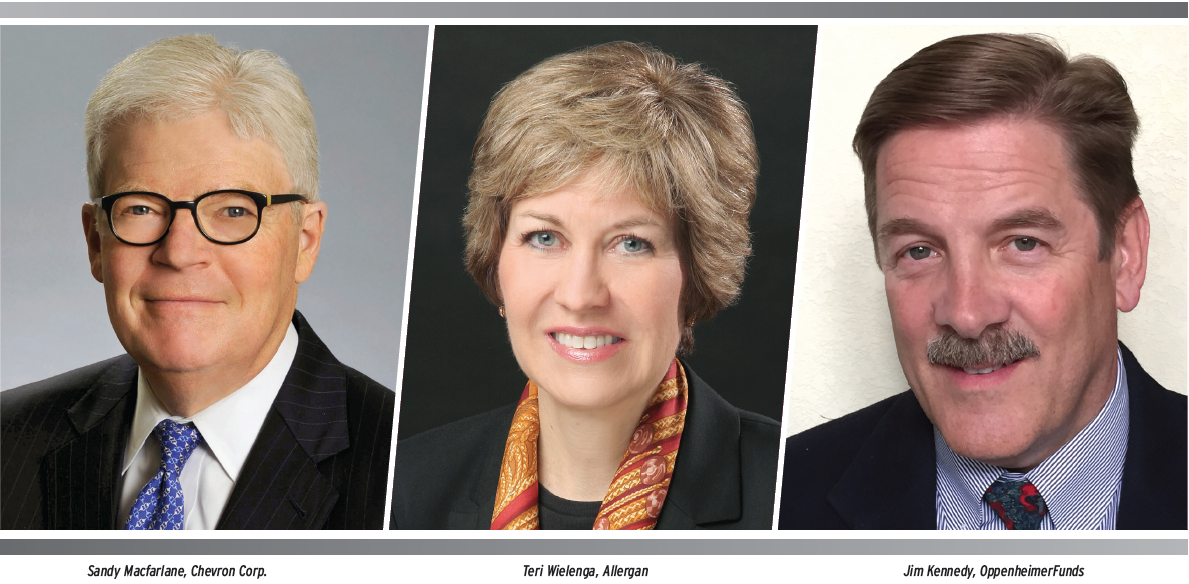The dizzying speed of technology, as software enables you to do your job not only quicker but more effectively. The expanding expectations of millennials, with their stated desire to better balance work and family. The burgeoning maze of regulations, with increasing government oversight. The globalization of the economy, as evidenced by our cover story on Latin America.
And, of course, social media.
These environmental factors are driving changes in all industries, and corporate tax is no exception. In March, we convened a conference call, moderated by Tax Executive Senior Editor Michael Levin-Epstein, to discuss the changing role of the chief tax officer. The participants in TEI’s third roundtable were: Sandy Macfarlane, vice president and general tax counsel at Chevron Corp., who has been with the company for thirty-one years and has headed the tax department since 2010; Teri Wielenga, senior vice president of tax at Allergan, who has been with the company for twenty-two years and has been head of tax since 2001 (at the time this interview was conducted); and Jim Kennedy, senior vice president and chief tax officer at OppenheimerFunds, who has been head of tax for nine years.
Michael Levin-Epstein: How has the role of the chief tax officer changed in the past five to ten years?
Sandy Macfarlane: Several things have changed fairly significantly in recent years. One is the timing of what we do. With the advent of FIN 48 [Financial Accounting Standards Board’s FASB Interpretation No. 48], now ASC 740 [Accounting for Uncertainty in Income Taxes], we have to come to closure on what our opinion is on the sustainability of our tax positions a lot earlier. It requires you to understand the transactions earlier, do the planning, and do your assessment of your likelihood of success at a much earlier time than in the old days. I think another thing that’s changed is that tax is so much more in the news, and anything you do you may have to explain in The Wall Street Journal someday. That has an effect on how you think about things.
 Teri Wielenga: I would say a couple of things from my perspective have changed. One is the amount of complexity we deal with today compared to ten or twenty years ago is really not even comparable. The international tax rules have continued to become more and more complex, not just in the United States, but across the globe—I think particularly what’s going on in the OECD [Organisation for Economic Co-operation and Development] with the BEPS [base erosion and profit shifting] initiative. The other thing that’s changed a lot, in addition to the complexity, is the extreme precision with which we need to deal with that complexity. Twenty years ago, your effective tax rate was much more of an estimate than it is today. With Sarbanes-Oxley, and Sandy mentioned FIN 48, there are so many more controls and so much more focus on how that calculation gets done. The precision that overlays the calculation is much more extensive than it was twenty years ago.
Teri Wielenga: I would say a couple of things from my perspective have changed. One is the amount of complexity we deal with today compared to ten or twenty years ago is really not even comparable. The international tax rules have continued to become more and more complex, not just in the United States, but across the globe—I think particularly what’s going on in the OECD [Organisation for Economic Co-operation and Development] with the BEPS [base erosion and profit shifting] initiative. The other thing that’s changed a lot, in addition to the complexity, is the extreme precision with which we need to deal with that complexity. Twenty years ago, your effective tax rate was much more of an estimate than it is today. With Sarbanes-Oxley, and Sandy mentioned FIN 48, there are so many more controls and so much more focus on how that calculation gets done. The precision that overlays the calculation is much more extensive than it was twenty years ago.
Jim Kennedy: I think when you ask the question “what has changed?” you have to keep in mind, “What really hasn’t?” You have to continue to really know the business you’re in, and of course, you have to be able to defend the work that you do against all scrutiny, whether it’s management, regulatory, tax authorities, or business leaders you work with. But as far as the biggest difference, similar to what Sandy mentioned, I’d say is the immediacy, the accelerated pace of business. The change in the business environment, the laws that we deal with, and the operations of our companies—it really requires the ability to respond very quickly, if not immediately, with tax analysis. So I think that’s important to keep in mind. I think there’s an increased focus on the contributions as a business partner and finding ways to make the operations or strategies even more successful from an after-tax perspective. Not just “here’s the lay of the land” or “you can’t do this; you can’t do that,” but “here’s how this strategy can be even better.”
If you look back longer than five to ten years to a decade or two ago, I think one of the more obvious changes is the role and prominence of women in the tax profession. When I was much younger, the women tax professionals were a small minority in the shops that I worked in, and now, for example, in my department the majority of the staff and managers are women tax professionals. Similar to what Teri mentioned, the greater reporting burden is something that’s more significant now. In between FATCA [Foreign Account Tax Compliance Act], and the more federal income-tax-return information that’s being required, and what’s happening with the OECD and the Common Reporting Standards, there are greater demands all the time.
Levin-Epstein: What are the drivers of that immediacy: Is it your bosses, shareholders, the public, the press, the government?
Kennedy: I would say it’s the regulatory environment as well as the business realities.
Wielenga: I think it could be any one of the things that you mentioned. I think it’s just the overall pace of business in general these days. We’re in the information age, and people want instant information. When anything changes, if there’s any new law or any new proposal, the question that comes along is “What’s the impact on us?”—and you have to be able to respond very quickly to that.
Macfarlane: I think you have a thirst for information about what tax effects might happen and specifically whether there will be any surprises. You’re expected to be on top of stuff right at the front so people know how things will turn out.
HEIGHTENED EXPECTATIONS
Levin-Epstein: To meet these heightened expectations of being able to provide a more immediate analysis, what’s the secret to success?
Macfarlane: First, we want to be involved early, as the business develops transactions and capital spending plans. Because if you’re involved early, you have a chance to shape the transaction, and then it’s a lot easier to understand where you are at the end. That’s always been a goal of ours, and it continues to be. I think that’s one of the key things. Another key piece is process. You need to have a regular process to make sure you’re on top of the things that are happening and that you’ve reviewed them and gotten your auditors comfortable with your treatment.
Wielenga: I think it is also people: If you don’t have the resources in your department to provide the kind of service that’s expected when somebody wants an immediate answer, then obviously it’s going to be much more difficult to do so. The challenge is getting management to understand what you do, why it’s important, and why you need resources to deliver. And if you have a good team, then it obviously makes it a whole lot easier than if you don’t. Then you do turn into more of a 24/7 situation, which isn’t fun for anybody. So I think having a good team of people and having adequate resources is very key to being able to deliver the response time that is often expected.
Kennedy: I concur with Sandy and Teri with respect to both early involvement and resources. The real challenge that you have is being able to effectively prioritize and to deploy those resources in the face of those significant and near-constant demands.
Levin-Epstein: In terms of being involved in corporate decision-making early on, is that something that you think has changed recently?
Macfarlane: That’s been a top priority in our company for my whole career. I used to have a manager who worked for me, and the tagline on his email was “Remember it’s never too early to call your tax adviser.” That’s always been a mantra with us, and I think it continues to be.
Wielenga: I would agree. It is a big challenge to stay plugged in with what’s going on with the business, particularly as the business grows. It is important to make sure people understand what you do and how you can bring value. I think it’s much improved today than comparing it to twenty years ago. I’d say, from my situation, I’ve been very fortunate to work with a management team that does appreciate where we can bring value and in most instances knows when to pull us into a transaction. I’m not going to say there haven’t been a few exceptions, but, by and large, I think we get pulled in when we need to get pulled in, and we’re generally a participant on the front end of major initiatives. If people understand what you do, why you do it, and why it’s important to involve you, then you can keep your department from being a black box. Some of that involves a bit of a PR campaign for your group, particularly if you have new management on the team that you haven’t worked with in the past and you want to orient them to what you do. Helping people understand how you can bring value is a huge part of becoming an effective business partner.
Kennedy: I think you certainly have an opportunity to become a victim of your own success—the more that you deliver value, the more you’re going to be asked—so I agree completely.
REGULATION, DIGITIZATION, GLOBALIZATION, AND SOCIAL MEDIA
Levin-Epstein: I want to look at external factors affecting your job. Can you rank these four factors in terms of importance to your job: regulation, digitization, globalization, and social media?
Kennedy: The regulation comes first, followed by the globalization, then social media, then digitization. The reason for that really is that regulation is always at the top of the heap for what it requires of you regardless of industry. Globalization is a combination of what you have to do, not only in your industry, but in the face of what is changing in the regulatory environment. Social media relates to our industry quite a bit, so that’s really important from a business perspective. That’s why I put that there.
Wielenga: I would agree with Jim. Regulation and globalization would be at the top. I would probably put digitization and social media tied at third. When we were talking earlier about what’s different today, complexity and precision [and] regulation and globalization are the underpinning of that and what causes the additional complexity and requires you to be more precise. It’s all a result of more regulation and dealing in a global economy.
“The challenge is getting management to understand what you do, why it’s important and why you need resources to deliver. And if you have a good team, then it obviously makes it a whole lot easier than if you don’t.”—Teri Wielenga
Macfarlane: I’m probably similar. I’d probably put globalization at the top, because the complexity you get from crossing borders is considerable. More and more, everything crosses borders. But the complexity of the laws, the regulations, the statutes, and the treaties is a huge driver of what we do. In terms of social media, that’s not been that big of a force in our day-to-day life in the tax department. The digitization—I’m not sure exactly what that means. If it’s using technology and streamlining processes and automating things, that’s really a big factor for us.
Levin-Epstein: Looking at the rest of 2015, what might be happening in the corporate tax area in terms of challenges?
Kennedy: I think it’s the need for prioritization and effective deployment of resources. We’ve got a lot on our plate, and we know more is coming.
Wielenga: I should clarify my answer by saying that the company I work for is being acquired—the deal will probably close in the next week or so—and I will be moving on as a result of that, so my priorities for 2015 are currently a work in progress. That said, if I were staying, if this deal hadn’t gone through and I was continuing to run a tax department, I think one of the big challenges is transfer pricing. It’s always something that we focus on, and I think aligning what you do in that area with the country-by-country reporting coming out of the OECD should be high on the priority list.
Macfarlane: The developments with the OECD and the BEPS project, particularly the transfer pricing reporting, will be a big priority for us this year because of the changes that are coming. The other thing that is having severe effects on our situation is that the price of oil has dropped significantly. That has increased cost pressures in our company.
“I have to admit, the most enjoyable part of my job is a tie, really, between the mentoring and future leader development, and the thing that I just love the most, which is creating and protecting shareholder value. I love having the opportunity to contribute, so it’s both for me.”—Jim Kennedy
IT’S THE PEOPLE
Levin-Epstein: What is the best part about your job?
Macfarlane: The people I work with.
 Wielenga: I would agree 100 percent: the people I work with. But I would also add that I am never bored in this job. There is always a new challenge, and I always enjoy it. But facing those challenges and having fun with them really centers on having a good team, and I’ve been very fortunate to have an outstanding team, which has made coming to work here every day a lot of fun. I would also add that one other dimension that makes my job very enjoyable is being involved in TEI, and I’m not just saying that because this is an article for TEI’s magazine. I am a very strong proponent of people being involved in TEI, and I think when you’re the head of a tax department, it really helps you be more effective at what you do by being involved and building the network in our organization. It really makes a huge difference.
Wielenga: I would agree 100 percent: the people I work with. But I would also add that I am never bored in this job. There is always a new challenge, and I always enjoy it. But facing those challenges and having fun with them really centers on having a good team, and I’ve been very fortunate to have an outstanding team, which has made coming to work here every day a lot of fun. I would also add that one other dimension that makes my job very enjoyable is being involved in TEI, and I’m not just saying that because this is an article for TEI’s magazine. I am a very strong proponent of people being involved in TEI, and I think when you’re the head of a tax department, it really helps you be more effective at what you do by being involved and building the network in our organization. It really makes a huge difference.
Kennedy: I have to admit, the most enjoyable part of my job is a tie, really, between the mentoring and future-leader development and—the thing that I just love the most—creating and protecting shareholder value. I love having the opportunity to contribute, so it’s both for me.
Levin-Epstein: What’s the size of your staff now, compared to five years ago?
Macfarlane: We’re almost exactly where we were five years ago. There are about 170 people in the corporate tax department, and we also have tax people in our operating companies. The corporate tax staff has stayed about the same, and the [operating company] tax people have stayed about the same. There are a few that have grown and a few that have shrunk, but we’re basically about where we’ve been. The business has grown, but our department is about the same.
Wielenga: For me, I’d say now we have twenty-one people in our corporate tax group, and five years ago it was maybe about seventeen. If I go all the way back to when I took the helm of the department fourteen years ago, it was probably about half the size; I think we had eleven versus twenty-one. So it’s definitely doubled in size over time, but we’re not too much bigger now than we were five years ago.
Kennedy: As the head of tax for an asset manager, I have responsibility for two different tax departments. Right now, I have about fifteen to twenty fewer people than I did five years ago, because we had lifted out most of one of those functions to an outside provider.
Wielenga: One of the things that has enabled us to keep our head count relatively flat is the use of technology. We’ve undertaken a technology initiative, and because of some of the things that we’ve been able to automate, we’ve really effectively leveraged. The resulting efficiencies have prevented us from having to add additional head count.
Levin-Epstein: How big an issue is cybersecurity?
Wielenga: It’s a huge issue company-wide, it’s not just limited to tax.
Macfarlane: It’s not left to us. We have others who work on that for the company as a whole, and we piggyback off those efforts. But it’s something that’s taken quite seriously within the company.
Kennedy: For us, it’s not a tax-specific issue, but it’s very significant for our industry.
Levin-Epstein: What’s been the biggest surprise for you in this job?
Kennedy: When I started out, the culture of tax departments was still pretty buttoned down, “old school.” Management was quite formal. Over time, and certainly now, I see that the tax folks really appreciate it when you’re being yourself, when you’re genuine, as opposed to someone who is more reticent. If you keep or have your sense of humor, particularly in stressful or demanding times, I think that helps as well. People are working hard, so you want to help keep things loose.
Wielenga: I think for me, if I think back on when I first started working in the corporate tax world, the U.S. corporate tax rate was not one of the highest rates in the world. As time has gone by, to watch the whole global business climate change to the point where now the U.S. has the highest statutory tax rate in the world and to watch our Congress continue to do nothing about that has been very surprising to me and very disappointing. To see them not take any action to level the playing field between U.S. multinationals and foreign multinationals has been very surprising and disappointing to me.
 Macfarlane: In terms of a surprise for the job, intellectually it’s not a surprise. But certainly emotionally it was a surprise. When I become the head of the tax department, it was the first time I hadn’t reported to a tax person; my boss is the CFO. You realize that the buck stops here, because your boss doesn’t really know enough about technical tax matters to give informed judgments beyond what you tell them. So you really are put into a position of having to make some tough calls sometimes. You’re ready for it, because you’ve been a tax professional for a long time. But I remember when I first started this job, I said (to myself), “Well there’s really no one else to pass this on to; it’s yours.”
Macfarlane: In terms of a surprise for the job, intellectually it’s not a surprise. But certainly emotionally it was a surprise. When I become the head of the tax department, it was the first time I hadn’t reported to a tax person; my boss is the CFO. You realize that the buck stops here, because your boss doesn’t really know enough about technical tax matters to give informed judgments beyond what you tell them. So you really are put into a position of having to make some tough calls sometimes. You’re ready for it, because you’ve been a tax professional for a long time. But I remember when I first started this job, I said (to myself), “Well there’s really no one else to pass this on to; it’s yours.”
Levin-Epstein: TEI has a new subcommittee on emerging professionals, and we now profile an emerging professional in every Tax Executive issue. Since you are more seasoned, how would you respond if an emerging professional came to you and asked, “What advice do you have for me? I’d like to be chief tax officer one day—how do I get there?”
Wielenga: I think it varies by individual. I don’t think the advice that you would give one person would necessarily be the same advice you would give another. It really depends on what specific developmental needs somebody might have to get to that point of being a head of tax. If I were to be asked that question, I would probably try to sit with the person and assess their strengths and where they need development, and the advice would be geared accordingly
Macfarlane: There’s a certain amount of just going where things take you, and you have to embrace them as they come to you. You end up with projects that at first don’t look to be a great help to your career, but you learn a lot doing them, and you meet a lot of people, and you develop a better appreciation for how things fit together. Over the course of a career, you build up those experiences in a way that you’re ready for the top job. If you really like what you’re doing and embrace those challenges, I think that’s the best way to become head of the department.
Kennedy: I certainly agree: There’s no one path to becoming CTO. There’s a combination of technical and soft skills required. I think the point that Teri made is very helpful: doing a SWOT [strengths, weaknesses, opportunities and threats] analysis to determine strengths and weaknesses. I would ask the person to look ahead at what they want to be spending their time on and what skills they think they need, either in this industry or any industry, as the tax profession advances and as business developments continue. There’s an ability to match that up with whatever passions they have from a professional and personal standpoint. That would probably serve them very well.
Levin-Epstein: Any last words?
Macfarlane: It’s a great field to be in, a great job to have, and can be a lot of fun.
Kennedy: I’d like to echo Teri’s point earlier about the role of TEI. We have started to make some good inroads on dealing with the intergenerational workforce. We will be making progress on continuing education and use of technology. We will be discussing high-performance teams and giving people career-path and leadership development opportunities. TEI is really focused on this, and I think it’s something that will help not only the organization but also the tax professionals who participate in it.
Wielenga: I don’t have anything more to add. You guys said it so well.
Do you have an idea for a roundtable topic or are you interested in participating in the next conversation? Tax Executive welcomes your involvement. Send ideas and participation inquiries to taxexecutive@theYGSgroup.com, and we will be in touch!




